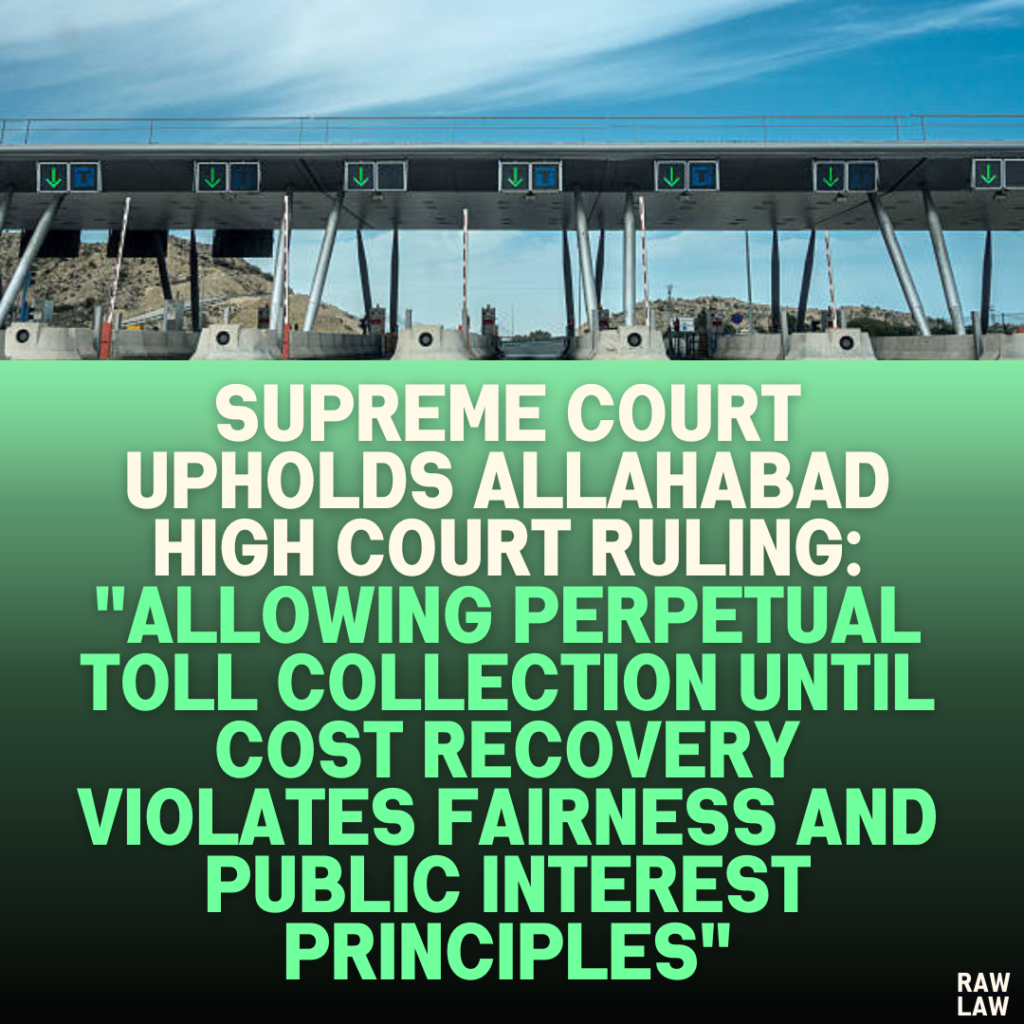Court’s Decision:
The Supreme Court upheld the Allahabad High Court’s ruling that toll collection on the Delhi-Noida Flyway by the NOIDA Toll Bridge Company Limited (NTBCL) was illegal. It declared that:
- Fee Collection and Levy: Delegating the power to levy fees to NTBCL violated statutory provisions. While NOIDA could authorize fee collection under the law, it had no authority to delegate the power to determine or levy fees.
- Project Cost Formula: The formula under the Concession Agreement was unreasonable and perpetuated cost recovery, resulting in toll collection indefinitely, which was contrary to public policy.
- Indefinite Concession Period: Allowing NTBCL to collect tolls until costs were recovered created a perpetual agreement, violating principles of fairness and public interest.
The Court emphasized that actions involving public-private partnerships (PPP) must adhere to constitutional principles, particularly transparency and public accountability.
Facts of the Case:
- Background of the Project:
- The Delhi-Noida Direct Flyway (DND Flyway) was a public-private partnership to improve connectivity between Delhi and Noida.
- NTBCL was incorporated as a Special Purpose Vehicle under a Build-Own-Operate-Transfer (BOOT) model.
- A Concession Agreement executed in 1997 allowed NTBCL to recover project costs and returns via toll collection.
- Over time, concerns arose about whether NTBCL had already recovered its investment and whether toll collection should continue.
- Writ Petition and High Court Judgment:
- A public interest writ petition was filed by a residents’ welfare association in 2012, alleging NTBCL had already recovered the costs and the continued toll collection was unjustified.
- The High Court held that Articles 13 and 14 of the Concession Agreement, dealing with fee determination and cost recovery, were invalid. It directed NTBCL to cease toll collection.
Issues for Consideration:
- Was the writ petition maintainable despite a delay in filing?
- Was the absence of a tendering process for awarding the contract justified?
- Did the delegation of fee-levying powers to NTBCL amount to excessive delegation?
- Did the formula for cost recovery and toll collection violate public policy?
- Had NTBCL already recovered the total project costs and returns?
- Was NOIDA entitled to recover dues related to outdoor advertising revenue?
Petitioner’s Arguments:
- Delay and Laches: The petition was filed 15 years after the Concession Agreement, making it inadmissible.
- Fee Levying Authority: NTBCL argued it was empowered under Section 6A of the Uttar Pradesh Industrial Area Development Act and subsequent regulations.
- Justification for Non-Tendering: NTBCL claimed there were no capable infrastructure developers at the time.
- Reasonableness of Cost Recovery Formula: The 20% assured return was necessary to attract private investment in a pioneering infrastructure project.
Respondent’s Arguments:
- Illegal Toll Collection: NTBCL had already recovered the project costs, making continued toll collection an illegal tax.
- Perpetual Concession Period: The agreement’s structure ensured indefinite cost recovery, preventing the return of assets to NOIDA.
- Public Interest Violation: The Concession Agreement was skewed in favor of NTBCL, burdening commuters without accountability.
- Impropriety in Fee Determination: The delegation of both fee levy and collection powers to NTBCL was beyond NOIDA’s statutory authority.
Analysis of the Law:
Maintainability of the Petition:
- Continuing Cause of Action: The Court held that toll collection was an ongoing act, creating a continuous cause of action. Thus, the delay in filing the petition was irrelevant.
- Public Interest: The Court emphasized that public interest litigation could not be dismissed on technical grounds like delay, particularly when fundamental rights and public welfare were at stake.
Delegation of Power:
- Statutory Framework: Section 6A of the Uttar Pradesh Industrial Area Development Act allowed NOIDA to authorize fee collection but not to delegate the power to levy fees.
- Excessive Delegation: By granting NTBCL authority to determine and levy fees, NOIDA exceeded its statutory powers, rendering the delegation invalid.
Formula for Cost Recovery:
- Unreasonable Returns: The formula guaranteed a fixed 20% annual return on the escalating project costs. This compounded costs indefinitely, making full recovery impossible.
- Inflated Costs: Expenses such as corporate gifts, legal fees, and inflated operation and maintenance charges further escalated the total project costs.
Perpetuity of the Concession Agreement:
- Automatic Extensions: The agreement allowed NTBCL to continue collecting tolls until the total project cost and returns were recovered, with no realistic end date.
- Violation of Public Policy: This arrangement ensured that the project would remain perpetually under NTBCL’s control, undermining public interest.
Precedent Analysis:
- Kasturi Lal v. State of J&K: Highlighted the need for transparency and fairness in public contracts.
- Joshi Technologies v. Union of India: Affirmed judicial review of public contracts involving public interest.
Court’s Reasoning:
- Illegal Delegation: NTBCL’s authority to levy fees was beyond the statutory framework and unconstitutional.
- Unjust Cost Recovery Mechanism: The cost recovery formula allowed NTBCL to indefinitely escalate project costs, burdening commuters without accountability.
- Breach of Public Trust: The agreement favored private profits over public welfare, necessitating judicial intervention.
Conclusion:
The Supreme Court affirmed the High Court’s decision, directing NTBCL to cease toll collection. It declared:
- Articles 13 and 14 of the Concession Agreement invalid.
- NTBCL’s indefinite cost recovery model violated constitutional principles and public policy.
Implications:
- Transparency in PPPs: The judgment underscores the need for transparency and accountability in public-private partnerships.
- Limitations on Private Powers: It restricts private entities from overstepping statutory limits in infrastructure projects.
- Public Interest Emphasis: The decision reaffirms the judiciary’s role in safeguarding public interest against exploitative practices.



